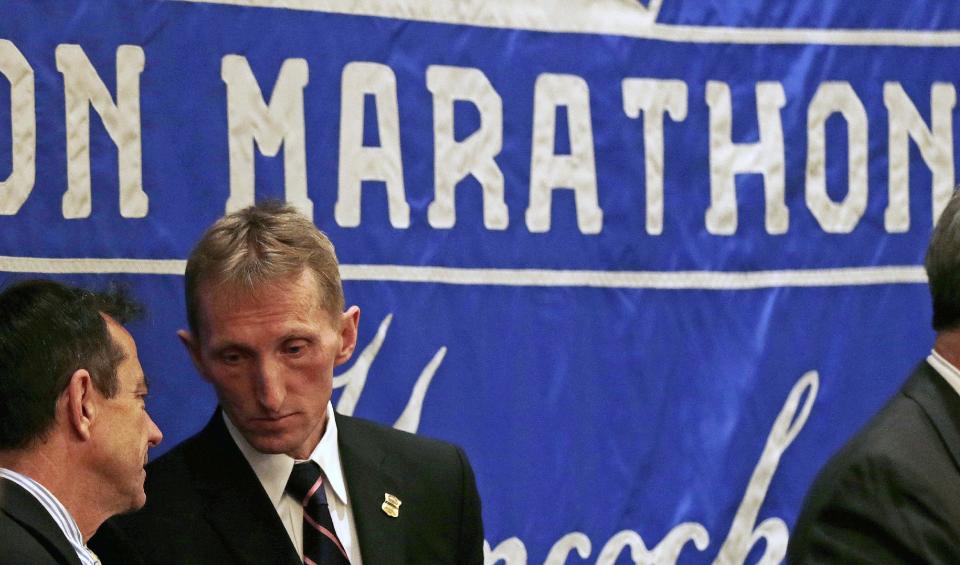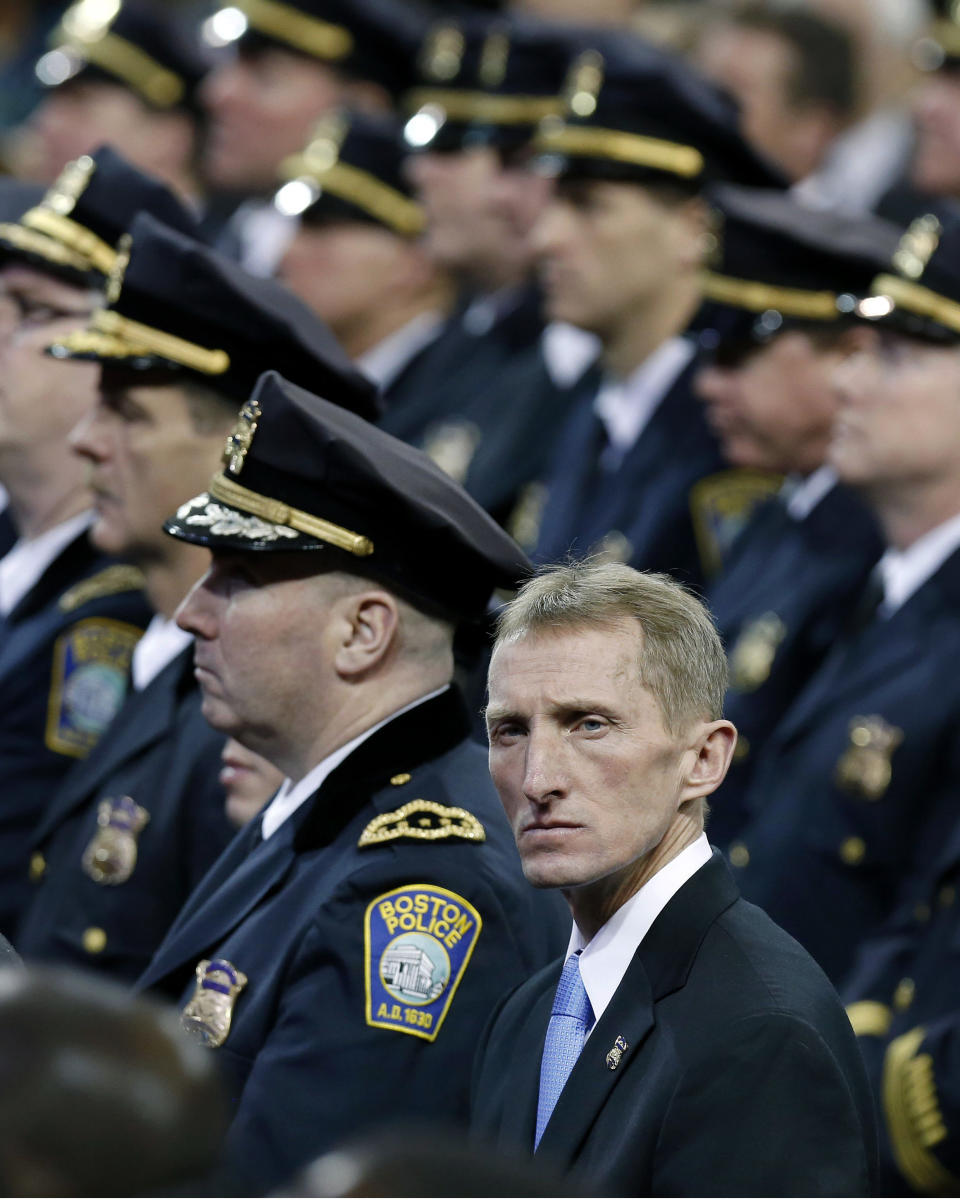For Boston's new police commissioner, keeping marathon safe means not running for a change
William Evans has run the Boston Marathon 18 times — this year, it's his job to return it to the city
BOSTON — Three days after the bombs exploded at the Boston Marathon, William Evans went for a run before work — at 3:30 a.m.
"The day the president and first lady came to town, I had to be at the scene at 5 a.m.," Evans, who at the time was Boston police superintendent, said in a recent interview with Yahoo News. "So I went out at 3:30 and ran for 30 minutes. I wanted to get my run in. I needed it — more mentally than physically."
The bombs, which authorities say were planted near the finish line by brothers Tamerlan Tsarnaev and Dzhokhar Tsarnaev, killed three people and injured more than 260 others.
"As you begin this long journey of recovery, your city is with you," Obama said at the interfaith memorial for the marathon bombing victims; "your country is with you. We will all be with you as you learn to stand and walk and, yes, run again. Of that I have no doubt. You will run again. You will run again."
The quiet, rail-thin 55-year-old, who was named police commissioner in January, is an obsessive runner of marathons, having completed 45 overall. He typically wakes up at 4:30 a.m. for his daily 7-mile run. On the weekends, he goes out for a two- to three-hour run.
"Running is my medicine," Evans, a married father of three and 31-year veteran of the police force, said. "It got me through that week."
Three days before Obama's speech, Evans ran the 2013 Boston Marathon — his 18th — finishing in 3 hours and 34 minutes, about 45 minutes before the bombs went off.
Evans was at a sports club in a hot tub when an officer ran in to tell him about the explosions. He didn’t believe it.
"An officer came in and said two bombs had gone off in Copley Square," Evans said. "I hopped out, showered off and got my uniform and jumped in the car. The whole way there I was thinking, 'That can't be true.' We've had transponders blow, blackouts there. I was hoping it was that."
Within 15 minutes, he was back at the finish line.
"When I got on Boylston Street, I saw the destruction," Evans said. "It was surreal. I saw the young victims lying where just 45 minutes ago I had run down the same street, on this beautiful day, with so much joy. Then to see the destruction — it's something I'll never be able to get out of my head."
A native of South Boston, Evans grew up with four older brothers who raised him after their parents died. He was just 14.
"My brothers brought me up, watched over me," Evans said at his first press conference as commissioner. "And I think I did pretty good."
Two of his brothers, John and James, became Boston firefighters; another, Paul Jr., served as police commissioner from 1994 to 2003.
"He was always my mentor and my role model," Evans said. "He was quiet and professional. I've always looked up to him, and always looked to him for advice."
A graduate of Suffolk University, Evans joined the Police Department in 1982 and rose through the ranks, from patrol officer to district captain and then superintendent.
In the aftermath of the marathon attacks, Evans played the older-brother role to other officers, "counseling them to remember their training and not act rashly as they searched for the suspects," the Boston Globe said in its report about Evans' elevation to commissioner.
"My leadership style is I'm not better than anyone else on the force," Evans told Yahoo News. "I was up at 1 a.m. walking the streets of Watertown. We were working 18 straight hours together. The whole manhunt lasted 102 hours. I think most of us were up for 90 hours of it."
During the frenzied manhunt for Dzhokhar Tsarnaev in Watertown, Evans was one of the first officers to arrive at the house where the 19-year-old had holed up inside a boat.
"Evans positioned himself in front of [the] house, looking straight up the driveway at the boat," Scott Helman and Jenna Russell write in "Long Mile Home," a new book about the bombings and ensuing manhunt. "He saw the suspect poking at the tarp. Everyone at the scene began yelling. Police thought he might be trying to get a gun through."
"When the shots started ringing out, I was screaming, 'Hold your fire,'" Evans recalled. "And that's when we got the FBI tactical team in there."
How was Evans able to show so much restraint while pursuing the most wanted man in Boston?
"We knew he was cornered and wasn't getting anywhere," Evans said. "But we didn't know what kind of armory he had. So we were in no hurry. Also, I didn't want any of the officers hurt in the crossfire.
"And I wanted him very much alive, so we could question him and find out how big the [terror] cell was," he added. "We didn't know what we had. There was too much at risk to have him deceased. I wanted to know exactly how he put together this attack on our city, and destroyed our marathon."
Evans, whose finishing time last year qualified him for the 2014 Boston Marathon, has decided to skip running it this year to focus on security.
In February, during a neighborhood meeting to announce marathon security plans, Evans promised a "soft approach" to dealing with what are expected to be record crowds: no metal detectors, no long security lines, no stopping spectators from enjoying the race. Instead, Evans is urging common sense, with uniformed and plainclothes officers — twice as many as last year — on alert for "strange" behavior and ordered to politely "shoo away" spectators near the finish line if it gets too crowded.
"You’re not going to see guys out there with body armor on and long guns," Evans said at the meeting. "We don't want to intimidate people. We want the Boston Marathon to be what it's always been: a family event."
On Marathon Monday, as it's called, Evans still plans to run — before he has to be at work.
"Oh yeah, I'll be up at 4:30, 5. I'll get my run in," he said. "Plus I'll be walking all over the place that day. It'll be my own marathon."
Related video:







